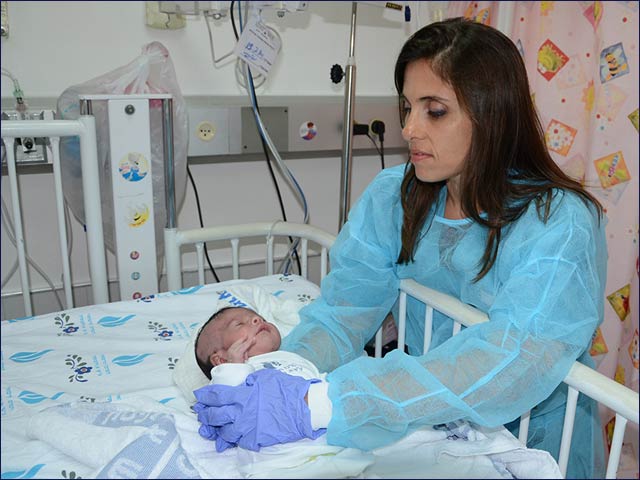By Rivka Borochov
Israeli medical relief workers have earned a name worldwide for their expertise in hitting the ground running in conflict and in turmoil. This was true in Haiti, when in January 2010 Israel’s IDF Medical and Rescue Team set up a lifesaving field hospital in Port-Au-Prince to offer urgent medical care to earthquake victims, and in 2011 when Israel did the same in Japan after a devastating tsunami.
This time, Israel has done something that would be unthinkable in other nations in times of war: it has set up a field hospital at the Erez Crossing, on the border between Israel and the Gaza Strip. The aim of the field hospital, which opened on Sunday, July 20, is to provide humanitarian care to Gazan civilians injured during the current conflict between the Israel Defense Forces and Hamas terrorists.
Major Guy Inbar, spokesperson for the Coordination of Government Activities in the Territories (COGAT), said that, as of August 11, the field hospital had treated 51 people. Among them were women, children and the elderly.
This is despite efforts by Hamas to dissuade Gazans in urgent need of care from visiting the facility, added Inbar.
“The hospital started as an initiative of COGAT’s general to give first assistance and humanitarian aid to Palestinians injured since the beginning of the operation [in Gaza],” he said.
“Some of the Palestinians received first and immediate aid and returned to Gaza; some were in critical condition and were transferred for further treatment to Israel, the West Bank or Jordan.”
For innocents caught in crossfire
While Israel does its best to warn civilians hours before incoming strikes to flee the area, Hamas encourages people to stay put in order to become “martyrs” in the name of the Palestinian people.
For those who do get injured, passage to the Israeli field hospital can be fraught with dangers and crossfire. Some may arrive by Palestinian ambulance or be taken across to the border area by Israeli vehicles, Inbar says.
He will not comment on whether or not the hospital has treated Hamas terrorists, but an IDF soldier named Daniel Albo told the Israeli newspaper Yediot Aharonot, “My team and I saved the life of a terrorist who tried to kill us because we are IDF soldiers and citizens of Israel. We saved him because we are human. I’m proud to serve in the IDF.”
Inbar says that Israel’s army opened the field hospital as a humanitarian act. The announcement was made after the entry into Gaza of a truckload of medical aid was delayed due to heavy shelling. According to Palestinian Authority Health Minister Jawad Awwad, the delay lasted two days. They asked for a humanitarian ceasefire to allow the supplies in, a request that Israel granted.
This is despite the fact that during the previous ceasefire request on July 17 three mortars rained down on Israel.
As of August 11, the field hospital was “still open and giving assistance,” Inbar’s office confirms. Able to accommodate 30 patients an hour, the facility is equipped to deal with emergency medicine, surgeries and family medicine.
Setting up a field hospital to treat the enemy is not new to Israel. In 2009, when hostilities between Israel and Gaza were winding down, Israel’s version of the Red Cross, the Magen David Adom (MDA) set up a center for Gazan civilians needing immediate care and expertise that Gaza facilities could not provide.
Waiting for the children
Meanwhile, Tamar Shapira, spokesperson and international director of Save A Child’s Heart (SACH), said that their doctors and staff are committed to continuing their work, regardless of the present situation.

Save A Child’s Heart head nurse Irena Nosel treats
a Gazan baby at Wolfson Medical Center in Holon.SACH offers lifesaving pediatric heart surgery and follow-up care to children from developing countries, including Palestinian children. Since 1996, SACH has operated on more than 2000 children from 30 different countries. Normally, every Tuesday SACH’s volunteer doctors open their clinic at the Wolfson Medical Center in Holon to give free cardiology exams and advice to parents of children with heart defects and related problems. This typically includes 15 or 20 patients from the Gaza Strip and the West Bank and sometimes from other Arab countries.
Right now it is difficult for the Gazan children to get to the Israeli medical center, but Shapira is certain that they will begin arriving again as soon as things get back to normal.